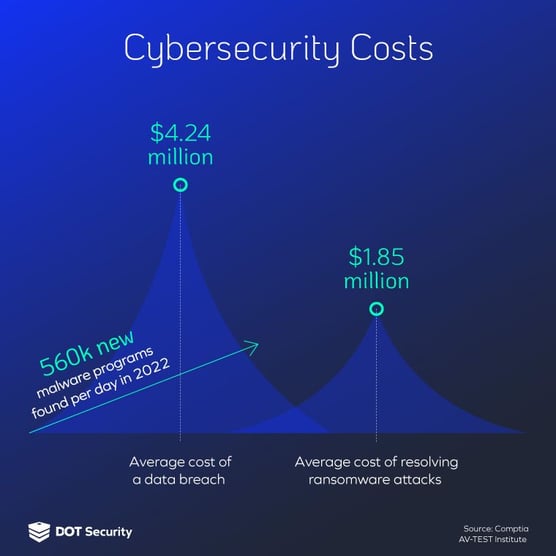What Are My Chances of Being Hacked?
A Business Quiz

August 2, 2022 5 minutes
Knowing where you stand against cybercriminals can help your organization manage their current cybersecurity program or create one.
“There are only two different types of companies in the world: those that have been breached and know it and those that have been breached and don’t know it.” -Ted Schlein
Whether you have the luxury of an in-house cybersecurity team, consult with a third-party cybersecurity analyst, or have just begun learning about learning about this topic, this quiz gives you a better idea of what next steps to take.
Take the quiz below
Keep reading to learn more about what your results mean and what to do about them.
Related Blog: 12 Basic Types of Network Security Measures
If You Run the Risk of Being Hacked
Since the cost of a data breach and reputation loss are higher than developing a cybersecurity program, it is important that your business create its own security protocol.

First, consider using MFA (multi-factor authentication) for shared employee accounts and installing anti-malware software to begin with. Practicing password hygiene is another step that's easy to implement. Password hygiene means using complex passwords, having a different password per account, and changing your passwords routinely.
Once you have basic coverage, you can begin thinking about which data is the most important to your company. Does your company handle any sensitive data? How can you protect your customers’ and your own information?
Once you have identified which assets needs protection, you can form a program to protect it. Not all data is sensitive, classified, or valuable, so knowing where to focus your efforts will help you avoid wasting resources.
Cybersecurity is a complex subject, so consider consulting an expert or enlisting the help of a managed cybersecurity provider who can protect your company while you continue handling business.
Consider adding a backup and disaster recovery program to your cybersecurity initiative as well. If a bad actor were to access your files, or if natural disaster affected servers, having a data backup option can prevent downtime for your business.
Related Blog: What Does an Audit and Compliance Specialist Do in Cybersecurity?
If Your Chances of Being Hacked Are Lower
You have done a great job so far in developing and implementing a cybersecurity program in your business.
If you haven’t already done so, using more advanced security technology can be the next step in your organization. For example, use next-gen antivirus, security monitoring, security information and event management (SIEM) to add even more layers of security to your business.
Consider adding ongoing employee training so that your whole company understands security goals and there is no miscommunication. Cybersecurity training helps employees understand the dangers of being hacked as well as the benefits of advocating for security.
If you want to strengthen your program even more, consider consulting with a cybersecurity expert to help you go in depth and find any gaps.
Take the quiz above if you haven't yet to find out your chances of getting hacked. Knowing where you stand in your cybersecurity journey can keep your business ahead of the curve!
